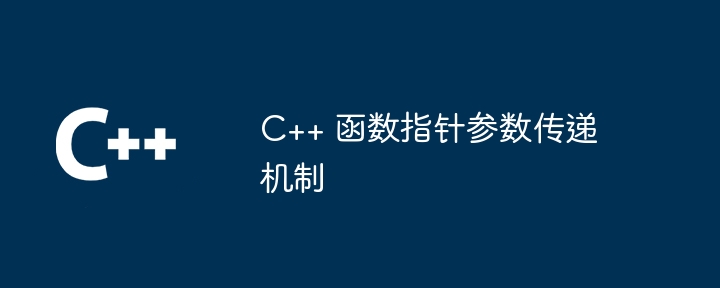Home >Backend Development >C++ >C++ function pointer parameter passing mechanism
C++ function pointer parameter passing mechanism
- 王林Original
- 2024-04-19 14:06:021258browse
The function pointer is passed as a parameter in C: the function pointer is passed as a constant pointer, a copy is created during the transfer process, the received function formal parameter points to the copy, and the dereferenced copy can call the underlying function.

C function pointer parameter passing mechanism
In C, function pointers can be passed to functions as parameters. This allows us to dynamically encapsulate function calls in a callable object.
Passing mechanism
When passing a function pointer as a parameter, the following mechanism is followed:
- A function pointer is essentially a pointer to a function address constant pointer.
- When a function pointer is passed to a function as a parameter, a copy of the function pointer is created and passed to the function.
- The formal parameters in the receiving function point to a copy of the passed function pointer. It can be dereferenced to call the underlying function.
Practical case
The following is an example of a C program that uses function pointers as parameters:
#include <iostream>
// 一个接受函数指针作为参数的函数
void callFunction(void (*function)()) {
function(); // 调用通过函数指针传递的函数
}
// 一个示例函数
void printMessage() {
std::cout << "Hello, world!" << std::endl;
}
int main() {
// 定义一个函数指针指向 printMessage 函数
void (*printMessageFunction)() = &printMessage;
// 将函数指针传递给 callFunction 函数
callFunction(printMessageFunction);
return 0;
}In the above example,callFunction The function accepts a function pointer (void (*function)() as a parameter, which points to a function that does not accept parameters and does not return a value. main Function A function pointer named printMessageFunction is defined that points to the printMessage function, which is then passed to the callFunction function. The callFunction function dereferences the function pointer (function()) and calls the underlying printMessage function to output "Hello, world!"
The above is the detailed content of C++ function pointer parameter passing mechanism. For more information, please follow other related articles on the PHP Chinese website!

